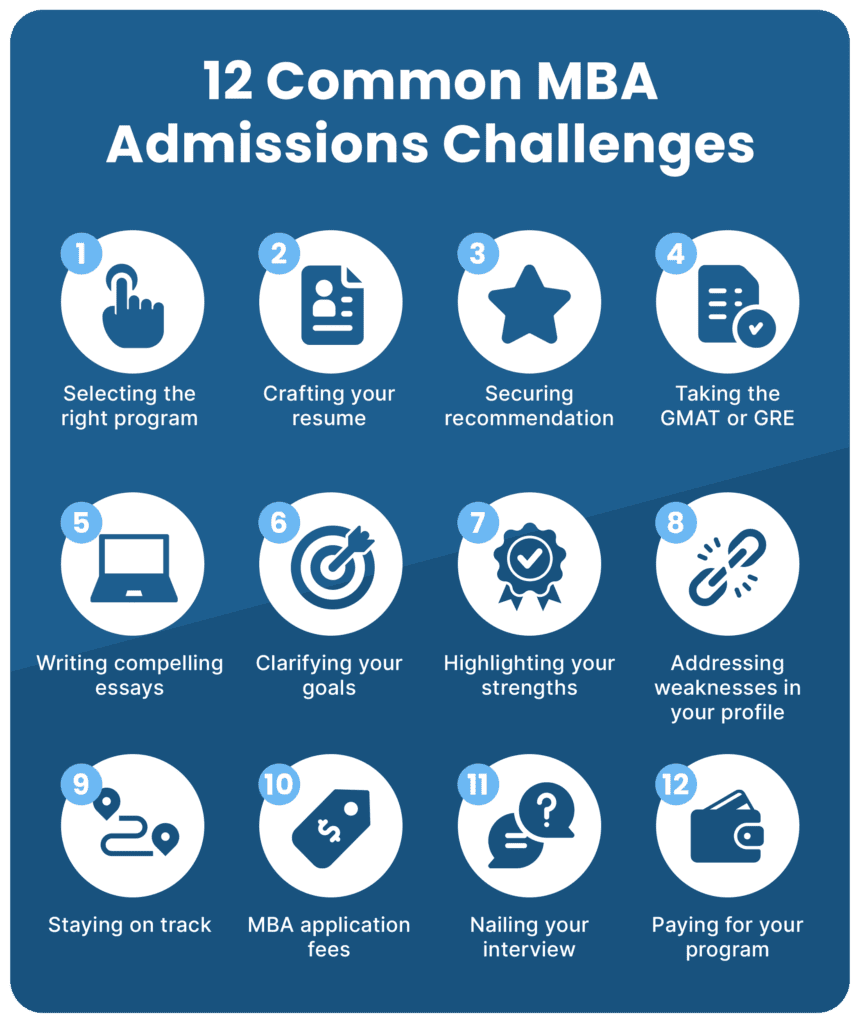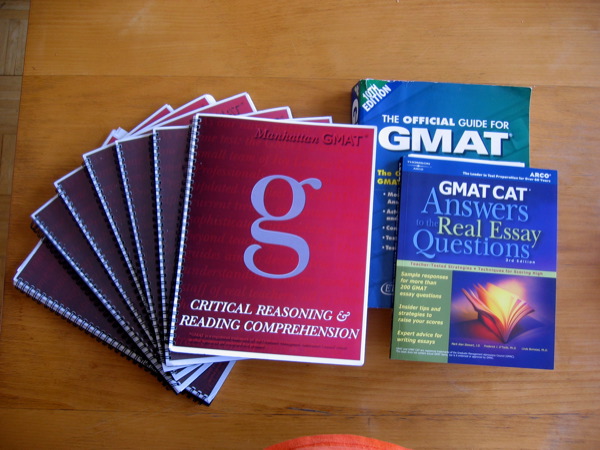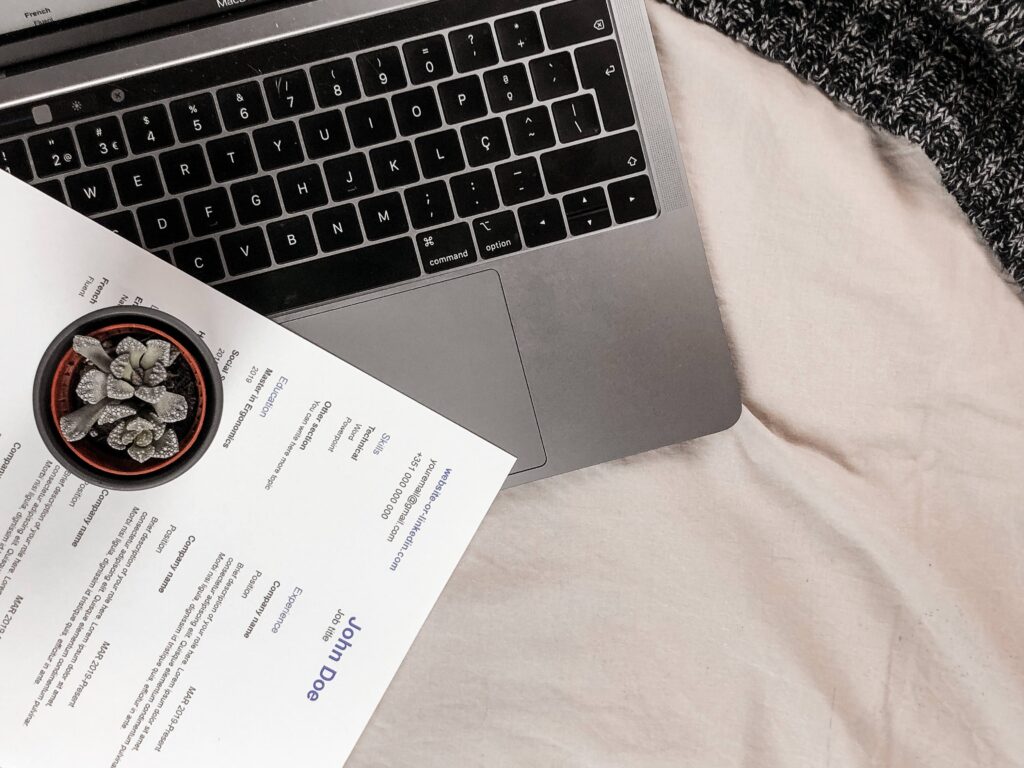
Overcoming MBA Admissions Challenges
If you are feeling overwhelmed or intimidated by the MBA admissions process, you’re not alone. The MBA admissions process is intense and can be difficult to navigate. However, understanding common MBA admissions challenges can help you avoid potential pitfalls. In the end, preparing for them is the best way to feel confident when it comes time to submit your applications.
Undoubtedly, the MBA admissions process is competitive, and MBA admissions statistics can be particularly daunting. On average each year, MBA admissions rates at top schools hover between 6% to 20%. These MBA admissions statistics are so competitive, in part, because the MBA is one of the most sought-after degrees in the United States.
In the long term, a Master’s in Business Administration can help individuals accomplish everything from getting a promotion or raise at work to starting a company or nonprofit. As such, many students apply, including international students.
So, what can you do to stand out as a competitive applicant? In this guide to MBA admissions challenges, we will provide you with tips to ace the MBA admissions process.
In this guide, we’ll discuss:
- The different pieces of the MBA admissions process and how to meet MBA admissions requirements
- Common MBA admissions challenges, with strategies for how to overcome them
- Tips for acing the GMAT and GRE
- Writing strong MBA admissions essays
- Tailoring your MBA resume for each of your MBA programs
- Preparing effectively for your MBA interview
- Financing your MBA
- Creating an MBA application strategy, including when to apply
With this guide, you’ll have the tools you need to make your MBA application stand out from the rest.
Understanding MBA Admissions Requirements

Whether you are trying to ace Columbia MBA admissions or Stanford MBA admissions, there are some common requirements you’ll likely encounter. Here are the most common MBA admissions requirements:
Transcripts
MBA admissions officers want to see that you have been able to complete rigorous coursework. Therefore, MBA program applications require your transcripts from prior institutions. Your undergraduate GPA is also an important factor. While there is no minimum GPA needed to be admitted to an MBA program, a higher GPA will make you a stronger candidate. Later, we will discuss an average GPA based on MBA admissions statistics and how you might offset a low GPA in your application.
Essays
Without a doubt, essays are an important part of your MBA application. This is because the top MBA programs in the world care deeply about building a diverse, creative, and thoughtful incoming class. Most MBA programs ask for at least one essay. Others, like Stanford MBA admissions, ask for two essays. In this instance, students must complete an essay about what matters to you and another about why you want to go to Stanford. The Stanford application also offers optional short answer questions you can complete to provide more context on your application.
Resume
Your MBA program resume should showcase your skills and past experiences, acting as a roadmap for how you’ll achieve your future goals. We will share more tips for crafting a strong MBA resume in future sections.
GMAT/GRE scores
GMAT and GRE scores are the equivalent of ACT and SAT scores for college admissions. Many MBA programs accept both the GMAT and the GRE. While some MBA programs do not require GRE/GMAT test scores, the top MBA programs in the world all do. There is no minimum GRE or GMAT test score required to get into an MBA program, but higher scores show that you are prepared for the rigor of an MBA program.
Letters of Recommendation
In MBA admissions, letters of recommendation play an important role in verifying that you are a strong candidate. In a future section, we will discuss who might be best suited to write your letters of recommendation for graduate school.
MBA Interviews
Once a program has determined you’ve successfully fulfilled the requirements outlined in your initial application, you may be invited for an MBA interview. While not all applicants are invited to interview, those who are will need to prepare, as the interview can make or break your application. We will share tips for acing your MBA interview later.
While these are the most common MBA admissions requirements, remember each program has its own unique set of requirements. For example, while Columbia MBA admissions requirements include GRE or GMAT test scores, the UCLA MBA admissions requirements do not.
Make sure to reference each school’s MBA admissions website to verify requirements and plan for how you will complete them. For applicants leading busy lives, you can take advantage of MBA admissions consulting services, like CollegeAdvisor, to ensure you meet the requirements.
12 Common MBA Admissions Challenges

Given the competitive nature of the MBA admissions process is competitive, creating a compelling and complete application is no simple feat. If you want to get into a school with low MBA admissions rates, you’ll need to spend adequate time ensuring your application is airtight.
For this reason, there are many MBA admissions consulting services in existence. CollegeAdvisor is one of them, offering several resources to help guide students through the MBA admissions process. Here are some common MBA admissions challenges you may face, which MBA admissions consulting services like CollegeAdvisor can help you overcome:
12 Common MBA Admissions Challenges
1. Selecting the right program
With the increasing popularity of the MBA program, there is an ever-expanding number of options to complete your MBA. In addition, there are different types of MBA programs that focus on different MBA subjects. To start, try to focus on your top 3 priorities for a program and identify schools that fit those needs. If your top three priorities are low cost, a part-time option, and a focus on nonprofit leadership, that can drastically help in narrowing down your options. An MBA admissions consulting service can help you narrow down your priorities and identify the right programs to apply to.
2. Crafting your resume
A strong MBA resume will have some similarities to a job resume, such as being a neatly crafted and clearly written document highlighting past experiences. Additionally, any MBA admissions consulting service will tell you your MBA resume also needs to demonstrate that you have the skills necessary to succeed in a variety of MBA subjects. You’ll want to research the programs you are interested in and tailor your resume to demonstrate that you have the qualities the program is looking for. If they are seeking leaders, then emphasize your leadership experiences.
3. Securing recommendations
Sometimes, students struggle to find someone who can write a strong recommendation letter for graduate school programs like an MBA. These letters of recommendation need to showcase your strengths and be written by a reliable source, preferably of a professional nature. The best recommendation will come from a direct supervisor, someone you have worked closely with who can speak to both your character and work performance. If you can’t find someone with whom you recently worked, consider expanding your list to former supervisors from internships or volunteer roles.
4. Taking the GMAT or GRE
Nervous about getting a high enough score on the GMAT or GRE? You’re not alone. Many students find test-taking to be one of the most daunting aspects of the MBA admissions process. To do well in this area, explore both tests to see which one might be a better fit for you. Allocate at least 80 to 100 hours to prepping for them, and be prepared to take them more than once if need be.
5. Writing compelling essays
Without a doubt, writing strong essays is an important and difficult part of the MBA admissions process. Start by zooming out to understand your story, values, goals, and strengths better via brainstorming exercises. Then, start to identify examples and stories that illustrate these parts of yourself. Remember, MBA applicants are typically college graduates with real-world, professional experiences. Your essays should reflect your maturity, drive, and eagerness to grow and develop your career trajectory.
6. Clarifying your goals
While it might sound like a good idea to get an MBA, the reality is that doing so is a huge investment of time, energy, and money. Therefore, making sure that getting an MBA aligns with your goals is key. Before you even begin to apply, consider what you are hoping to accomplish personally and professionally by getting an MBA. In doing so, you’ll also be engaging in one of the top MBA essay tips, which is to brainstorm before writing.
7. Highlighting your strengths
Sometimes, students don’t know what their strengths are or how to highlight them. In addition to spending time reflecting on your strengths based on prior experiences, ask friends, family, classmates, or mentors to help you identify some of your strengths. Often, an external perspective can be very eye-opening.
8. Addressing weaknesses in your profile
Undoubtedly, there is no perfect MBA applicant. Perhaps as you prepare your application, you begin to worry about your GMAT test scores, your writing abilities, or your letters of recommendation. Rather than focusing on these weaknesses, identify how to strengthen the other parts of your application. Since applications are assessed holistically, one aspect of your application can boost your overall application significantly.
9. Staying on track
As we went over, there are numerous MBA admissions requirements. If you are busy working or studying, it can be hard to keep on top of all of them. This is where MBA admissions consulting companies like CollegeAdvisor can help. We can provide you with a plan and accountability for staying on top of the process.
10. MBA application fees
Perhaps you are ready to apply and just realized how expensive the MBA application fees are. Indeed, some programs charge hundreds of dollars just to apply. If the cost of applying is overwhelming, consider requesting fee waivers from schools. Some programs, like Harvard MBA admissions, automatically waive your fee if your income is under a certain amount.
11. Nailing your MBA interview
Invited to an MBA interview? The first step is to prepare. In contrast to undergraduate college admissions interviews, MBA interviews hold more weight in the process. Therefore, you’ll want to spend time brainstorming responses to common questions and memorizing a few examples of accomplishments that demonstrate your strengths. A good MBA admissions consulting service can help you prepare so you can ace your interview with confidence.
12. Paying for your program
Once you are admitted to your program, you’ll need to figure out how to afford the tuition. In addition to searching for scholarships both within and beyond your school, you’ll want to complete the FAFSA so you can qualify for lower interest federal loans. While the cost may cause sticker shock, remember that depending on the type of MBA and your future goals, you could end up earning a much higher salary by earning your MBA. Ultimately, an MBA is an investment in your future, but it’s one you need to thoroughly prepare for.
Now that we have introduced some of the most common MBA admissions challenges, we’ll explore how to overcome them in greater detail.
Crafting a Compelling MBA Essay

Just as essays are critical in the undergraduate admissions process, the MBA essays are equally as important. In this section, we’ll provide some crucial MBA essay tips.
To begin with, the majority of top programs require a “Why MBA” essay. For example, the Harvard MBA admissions requirements include a 900-word essay that asks you the following:
We invite you to share personal or professional experiences from your background that give you a unique ability to contribute to HBS. Try to remember to not overthink or overwrite in this essay; it is best to answer the question in clear and concise language that those of us who don’t know your world can understand.
In other words, this essay prompt is asking you to describe your specific experiences that also make you a good fit for the MBA program at Harvard. When answering this question, and other “Why MBA” questions, remember the following MBA essay tips:
MBA Essay Tips
Highlight your strengths
A compelling essay showcases what makes you unique. Rather than focusing on what you think admissions officers want to hear, share what authentically makes you, you. For example, maybe you moved around a lot as a kid and learned how to adjust and build relationships quickly. While you can also name challenges you have overcome, make sure to highlight how they have taught you lessons that will aid you in being successful in your MBA program.
Discuss your resume
In your essay, reflect on past experiences that are on your resume which demonstrate your strengths or how you have grown. Be careful not to repeat too many details that are on your resume. Rather, think of the essay as a time to give more context and color to your professional history. You can also use the essay as a space to explain any gaps in your resume, such as time spent not working. Indeed, share what you did during this time and how it contributed to your personal or professional growth.
Demonstrate cultural fit for the program
As we mentioned, there are many types of MBA programs, each with their own culture. As you write your essay, identify ways to demonstrate your own alignment with the program. For example, if a program seems globally focused, consider emphasizing ways in which you have contributed to or connected with global causes.
Polish your writing
Lastly, but very importantly, a compelling MBA essay must be written clearly and concisely. Ask multiple people to read your response to check for proper grammar and to tell you if your response effectively answers the prompt.
Now that we have reviewed some common MBA essay tips, let’s look at another common challenge – testing.
Overcoming Test Anxiety for GMAT or GRE

As MBA admissions rates become more competitive each year, you may feel even more pressure to do well on graduate school exams. The GMAT and GRE are both competitive exams, and both tests are accepted by many MBA programs. One test is not better than the other, but they are slightly different in format and focus. Ultimately, you’ll want to take the exam that makes more sense to you.
Along the way, you might encounter test anxiety. MBA admissions statistics show that applicants to top MBA programs tend to have an average of 730 out of 800 on the GMAT. As a result, test anxiety is completely normal. However, there are ways to mitigate it and get a good score. Here are some helpful tips for overcoming test anxiety.
GMAT/GRE Test-Taking Tips
Identify the source of your anxiety
Does the timed nature of the exam stress you? Are you overwhelmed by testing conditions? Do you get lost in thinking about how this one exam could determine your whole career trajectory? Determining the source of your anxiety can help you specifically address it, so you can focus on finding solutions that work for you.
Identify anxious behaviors
Anxiety can manifest in a lot of different ways. Some students overstudy, spending far too long engaging in practices that aren’t fruitful. Maybe you are focusing way too much on the GMAT and ignoring parts of your life or application. Are you focusing too much on the future? Comparing yourself to others? Once you identify your anxious behaviors, you can identify ways to interrupt them.
Practice positive habits
Once you have identified what is unhealthy, seek out ways to manage your anxiety with positive habits. Develop a study plan with small goals, or engage in health habits like mindfulness practices, eating well, and getting sleep. You can also engage an MBA admissions consulting service for tutoring support.
While your GMAT and GRE scores are important, so is your recommendation letter for graduate school. Next, we’ll look at who should write your MBA recommendations.
Who should write your MBA recommendations?
Like all letters of recommendation, your recommendation letter for graduate school should be written by someone who knows you well and can speak to your unique qualities and strengths. One key difference is that your MBA recommendation should generally be written by someone who knows you in a professional context, such as a manager or supervisor. This is because MBA programs are looking for practical skills like leadership, teamwork, and communication skills as much as they are looking for academic ability.
For example, UCLA MBA admissions requirements ask for two letters of recommendation from individuals who know you in a work setting. To help applicants, UCLA offers a letter of recommendation form that gives a sense of what kind of information they are looking for. If your current job situation doesn’t allow you to ask for a current supervisor to recommend you, ask a previous manager from past companies, internships, or volunteer organizations.
Strategies for Mitigating a Low Undergraduate GPA

Indisputably, MBA admissions statistics reveal that an average undergraduate GPA for applicants accepted to top MBA programs in the world is at least 3.5. However, as this is an average, there are successful applicants who had lower GPAs. So, how did they get in?
The answer is that MBA admissions are holistic in nature. As such, schools are looking at your application in its entirety. While a low GPA won’t preclude you from getting into an MBA program, it does require you to strengthen other elements of your application. This is where MBA admissions consulting, such as that offered by CollegeAdvisor, can be particularly helpful.
Tips for Balancing Out a Low GPA
Get a strong GMAT/GRE score
Strong test scores show your dedication to success and that you have the necessary foundation and skills needed to succeed in graduate-level coursework.
Acquire glowing letters of recommendations
With compelling letters of recommendation, you can highlight your best qualities and strengths in a work environment. Skills like leadership, teamwork, and communication can’t easily be reflected in a grade point average.
Build an effective MBA resume
A good resume can show your accomplishments outside of the classroom. With a strong resume, you can demonstrate commitment to growth, hard work, and contributions in the workplace.
Next, we’ll look at how to tailor your resume to different types of MBA programs.
Tailoring your MBA Resume

To ensure your resume can overcome low MBA admissions rates, make sure to tailor it for each of the programs to which you apply. Here are some tips for building an effective MBA resume.
MBA Resume Tips
Highlight your strengths and achievements
While you probably have many strengths and accomplishments, highlight those that are most aligned with the MBA subjects you are hoping to pursue. For example, if you are applying to an MBA focused on entrepreneurship, demonstrate moments when you created or led initiatives within your roles.
Demonstrate measurable impact
The most effective MBA resumes are specific about the candidate’s impact. For example, instead of saying you helped grow the company, state that you increased sales by 50% and successfully managed a team of five new employees.
Keep it scannable
Though it might be tempting to submit a ten-page resume with every activity you have ever done, by doing so you will quickly lose an admissions officer’s attention. Keep your resume to a single page, making it easily scannable by using keywords that are also on the program’s website.
Thankfully, some schools like Yale School of Management offer templates for MBA resumes. After drafting your resume, take advantage of MBA admissions consulting to get feedback on the effectiveness of your resume.
Preparing for your MBA Interview

With MBA admissions statistics showing quite competitive MBA admissions rates, you’ll need to have a successful interview to gain admissions. And, similar to your essays and recommendations, the MBA interview is a crucial part of the MBA admissions process.
In fact, your interview is one of the best ways to show MBA admissions your personality as well as why you are the perfect fit for their program. Therefore, like every step in the MBA admissions process, you’ll want to prepare to make sure that you’re giving your best MBA interview possible. In fact, you’ll want advanced preparation for this important step of the MBA admissions process.
Even if you’ve aced previous job or internship interviews, you’ll need to do ample research to stand out to your MBA admissions interviewer. Research the specific program to which you are applying and note aspects that stand out to you. Why do you want to gain MBA admission to this specific program? You should also prepare some questions to ask at the end of the interview.
Practice makes perfect
Most importantly, you’ll need to practice for your MBA interview. Think about how you’d answer difficult questions. In fact, we recommend preparing your answers to common MBA admissions interview questions so that you won’t be blindsided when you’re in the MBA interview.
You might even simulate an MBA interview with a friend. Look up common MBA admission interview questions and have them ask you. Treat the simulation like the real deal and practice giving your best answers. You don’t want to simply memorize your answers, but you do want to know how you’d respond to varying questions.
Additionally, look to your MBA resume to help you think about aspects or experiences you may want to highlight in your MBA interview. How can you work your unique experiences, backgrounds, and interests into your responses to common MBA interview questions? Since the MBA interview is such a vital part of beating the competitive MBA admissions rates, prepare accordingly! Look to our guide on MBA interviews to be sure you give your best interview.
Managing MBA Application Deadlines
The MBA admissions process is extensive. Therefore, applicants will want to give themselves at least a few months to prepare. That being said, many of the most competitive candidates start preparing over a year before the deadline! You’ll have some choices when it comes to the MBA admissions deadlines, so you’ll need to decide which works best for you.
MBA admissions deadlines will vary based on the specific program. However, generally, all MBA programs have three different rounds of deadlines. Here are the general deadlines for each round:
- Round 1: September and October
- Round 2: October to January
- Round 3: January through April
Aim to apply to your top-choice programs for Round 1 and 2 deadlines. If you don’t gain MBA admissions to those programs, then you can apply to your safety schools in Round 3. Additionally, Round 2 generally has the largest applicant pool. So, you’ll increase your MBA admissions odds by applying to your top program in Round 1.
Alternatively, by Round 3, MBA admissions teams aren’t giving out many offers as most of the top candidates were admitted in the first two rounds. In general, MBA admissions aren’t rolling. However, you could be deferred from Round 1 to Round 2 where your application will be reviewed again and either accepted or rejected.
Staying organized
As you may note, choosing and meeting your MBA admissions deadlines is extremely important to gaining admission to your dream program. You’ll want to stay organized in order to meet each deadline for your top programs. Applicants can create a calendar with deadlines or other application milestones to stay on top of program requirements.
For example, you may have a deadline for taking the GMAT or GRE, requesting a recommendation letter for graduate school, finishing essays, etc. Again, MBA admissions consulting services can help students meet their deadlines and stay organized throughout the application process. If you know you struggle with these aspects, and can afford to do so, then you might look into MBA admissions consulting services to keep you on track. After all, you won’t be a part of any future MBA admissions statistics if you don’t submit your application by the deadline!
Choosing the Right MBA Program

Since the MBA admissions process is tedious, you’ll want to be sure that you’re in love with the programs you’re applying to. While many MBA programs often offer similar MBA subjects and coursework, there are many types of MBA programs catered toward certain areas of interest. Therefore, you’ll want to thoroughly do your research on a program before starting their MBA admissions process. There are plenty of lists of “Top MBA Programs in the World”, however, that doesn’t mean they’re your best fit! Likewise, MBA admissions rates aren’t always the most telling factor of the best programs for you.
Finding the right fit
Finding the best program for you is similar to finding your dream undergraduate school. You’ll want to consider a variety of factors such as location and cost. However, you’ll also want to look into the program type and focus. While many MBA programs offer similar MBA subjects and courses, some specialize in certain areas. For example, some programs are better for entrepreneurship than others.
Think about your future career goals. Do you want to work at a large corporation or have a start-up? Is there a specific business area that most excites you? Consider the reasons you want to complete an MBA and then search for programs that align with those preferences and values.
You’ll also want to think about the campus culture. Does it align with your values and interests? While MBA admissions can feel intense, actually completing an MBA will also be time-consuming and intensive. Therefore, you’ll want to be sure that you like the campus, facilities, and faculty leading the program.
Always keep in mind important admissions requirements as well, and factor them into your application process. For example, UCLA MBA admissions requires not just one recommendation letter for graduate school, but two recommendation letters for their MBA program.
Financing your MBA degree

When considering gaining MBA admissions, you’ve probably thought about the cost of the education that you’re about to embark upon—and if you haven’t, you should. Choosing to pursue an MBA is no small investment. In fact, it’s one of the most expensive Master’s degrees that you can pursue. Therefore, an important step of the MBA admissions process is figuring out how to pay for your MBA.
Average MBA cost
According to a recently published Forbes’ article, on average, an MBA degree costs around $60,000. However, the cost will vary depending on your program, scholarships, etc. An MBA could cost anywhere from $30,000 to $120,000. Of course, many factors will affect the cost of your MBA, such as if you’re applying in or out of state. Additionally, more ‘prestigious’ programs will have a higher price tag. For example, if you gain Harvard MBA admissions you could pay over $230,000.
Options for financial assistance
However, some employers will actually help you pay for your MBA. This is an excellent option as it offsets the overall costs. Keep in mind that if you go this route, your employer will likely have other requirements that you have to complete. For example, Bank of America employees are reimbursed yearly up to $7,500 for courses related to their jobs (this includes MBA subjects or courses). However, they must have been employed for at least six months and have earned a B or higher. Other employers have different requirements. Usually, though, the benefits outweigh the cons. Some companies even offer full reimbursement for an MBA degree!
Of course, if financing your MBA is a concern, you should look to scholarships and financial aid as well. Some programs will have better opportunities than others. Or, you may be able to find outside scholarships and funding. Check out our guide specifically on MBA Scholarships & Financial Aid to learn all about getting help with funding your MBA.
Making your MBA Application Stand Out
While an MBA is one of the most common Master’s degrees, it’s certainly not easy to gain admission to top MBA programs. That’s why it’s important to make sure that your application stands out from the crowd. However, to impress an MBA admissions team, you’ll need to know what they look for.
It may come as no surprise that MBA admissions are looking for candidates with strong leadership skills. Luckily, there are many ways to show this such as demonstrating leadership roles or a specific initiative you took on a project. As an MBA applicant, you may have ample work experience and specific career goals—these should be highlighted throughout your application.
Additionally, academics are important when it comes to getting into the best programs. Therefore, you’ll want your GPA to be competitive. You’ll also need to prepare to take the GMAT test, a standardized test specific to the MBA admissions process. Take it early on in case you need to test multiple times to improve your score.
And, be sure to use all the MBA essay tips you can find! Some top MBA programs in the world even offer their own essay tips. The essay is another way to enhance your application narrative and highlight your leadership skills. Be sure to prepare and keep in mind MBA essay tips from knowledgeable sources. Of course, the best MBA essay tips will be to use your unique experience to show why you belong in the specific program you’re applying to. No two essays will read the same as they should be personal, while still giving important insight to the MBA admissions teams reading them.
Being authentic
Of course, being authentic and honest throughout your application is important. MBA admissions doesn’t want your application to read as though it was written by a business-focused robot. Use the application to show who you are. However, don’t stray from the topic at hand: gaining MBA admissions. Highlight your skills while also showing your personality and tenacity. The MBA interview is especially important in showing MBA admissions who you are and why you’re a perfect fit for their program.
Of course, always research the specific program to see what it’s looking for in applicants. While most look for similar qualities in candidates, there are nuances to which you can cater your application. For example, Stanford MBA admissions evaluate “how you think, how you lead, and how you see the world.” On the other hand, Columbia MBA admissions looks for candidates who have a strong work ethic, are ready to build professional and personal relationships, and want to use their chosen field to make an impact on the world.
Applying as an International Student

There are all types of MBA students, including international students. Much of the MBA admissions process is the same whether you’re an international or domestic student. However, there are some important differences that international students need to keep in mind when considering their MBA admissions requirements.
Similar to everyone, international students will need to submit transcripts, letters of recommendation, essays, and the GMAT test. Just like other applicants, international students will want to demonstrate their unique qualities and experiences that make them a perfect fit for the MBA programs they’re applying to.
However, international students will also need to complete an English proficiency test (if it’s not their native language). Also, while the same MBA interview and MBA essay tips apply to everyone, international students should note that they’ll have virtual interviews. Therefore, there may be some nuances in your approach to the interview. Although, the general preparation will be quite similar.
Most importantly, if granted MBA admissions, international students will need to apply for a visa in order to complete their studies! If you’re concerned about the interview and other aspects of MBA admissions, international students may look to find MBA admissions consulting. These experts will help you with everything from essays to interviews. MBA admissions statistics show us that MBA admissions rates are quite selective, so gaining expert advice can only help your chances!
Asking for help from MBA Consultants

Looking at MBA admissions statistics, you’ll find many of the top programs have acceptance rates between 10-30%. Whether you’re looking to gain Harvard MBA admissions or UCLA MBA admissions, you’ll want to do everything you can to give your application an edge.
For some students, this may simply mean giving yourself ample time to prepare your application. This includes practicing for the MBA interview, researching and applying MBA essay tips, and making sure your application has a cohesive narrative. However, other students may want to enlist the help of MBA admissions consulting professionals.
With MBA admissions so competitive, MBA admissions consulting is becoming more popular. MBA admissions consulting is similar to any type of college counseling. The job of experts providing MBA admissions consulting is to help you craft your most competitive application. An MBA admissions consulting professional will guide you through the entire MBA admissions process.
Benefits of MBA admissions consulting
There are plenty of benefits of MBA admissions consulting, but probably the biggest one is that these services streamline the application process. Of course, MBA admissions consulting experts won’t complete your application for you—but, they’ll guide you every step of the way, which alleviates a lot of stress for many applicants. With so many admissions requirements, MBA admissions consulting services will keep students on track, organized, and prepared to meet their top programs’ deadlines.
MBA admissions consulting experts also help applicants prepare for the most stressful parts of the application process: the MBA interview, GMAT/GRE, and essays. The best MBA admissions consulting experts will likely have you do a mock interview with them to prepare for the real thing. And, with such extensive experience, an MBA admissions consulting expert will also provide the best MBA essay tips. They know what works and doesn’t and will be able to help craft your most competitive application. Additionally, they can give you some pointers on taking standardized tests and alleviating some of the anxieties that may come along with these types of exams.
CollegeAdvisor has a team of experts who can provide MBA admissions consulting. They’ve helped hundreds of students get into their dream programs. In addition to personalized MBA admissions consulting, CollegeAdvisor also has plenty of free online resources. So, take advantage of the many guides and articles available when preparing to apply for an MBA.
Planning your MBA Admissions Strategy

No matter if you’re applying for Stanford MBA admissions or Columbia MBA admissions, your application strategy should center around answering these two questions: “Who are you?” and “Why should you be accepted to the program?”
Of course, every aspect of your application must work together to answer these questions. When crafting your application, think of every requirement as an essential piece of the puzzle. Without one piece in place, MBA admissions won’t have a full, accurate picture of you as a candidate. Here are a few final tips to help you plan your MBA admissions strategy:
MBA Admissions Tips
Reflect upon your experiences
Self-awareness is an important aspect that MBA admissions look for in their candidates. They want to see applicants who are committed to both personal and professional growth. Consider your unique qualities: What are your strengths? How has your background shaped your values? What have you accomplished? What are your future goals? All of these questions should be answered upon reading your application. Self-reflection is the first step to get you started in your MBA admissions process.
Be selective
While looking at lists or articles about the best MBA programs may help you get motivated, it’s not the best way to find the perfect program for you. After reflecting upon what you want from a program, you’ll be able to seek out those that will meet your preferences, needs, and interests. Additionally, consider the program’s admissions requirements. Do you have the scores and grades to be competitive? Do they offer your area of interest and focus? Can you foster important and meaningful connections there? There are plenty of types of MBA programs, so you can certainly find the perfect fit for you!
Start early
There are many moving pieces in an MBA application. You’ll need to stay on top of deadlines and ensure you submit all of your requirements in a timely manner. Be sure to take the GMAT test or GRE test early in case you need to improve your score. Also, you’ll want those scores available when seeking out viable programs where you’ll be a competitive candidate. Start researching programs and building important relationships with recommenders well before round 1 application deadlines. Additionally, look for opportunities to grow and develop in your current position. Not only will it give you important experience, but it will help enhance your MBA application.
With so many students interested in top MBA programs in the world, there are plenty of resources to help you when applying to all types of MBA programs. Take advantage of them! For example, look at successful essay examples or interview tips from accepted students. This information is readily available online and even on some schools’ admissions sites.
You might also look to see your MBA admissions statistics by using this calculator—you can even see your chances by specific programs. And, whether applying to Stanford, Harvard, Georgetown, UCLA, or any of the other top MBA programs in the world, you’ll want to make sure you have time to prepare your materials and craft your best application.
MBA Admissions Challenges – Final Thoughts
Navigating everything from the GMAT or GRE to interviews to essays may feel like a huge undertaking. However, you’re not alone! Plenty of students take on an MBA each year, meaning they also made it through the competitive application process.
In this article, we covered the many parts of an MBA application including the resume, essay, recommendation letter for graduate school, and cost. We also looked at ways to make your application stand out—even if you have a low GPA or GMAT/GRE scores.
We understand that applying for an MBA is a lot of work, but CollegeAdvisor is here to help you through the application process. Use our online library of free resources to help you with everything from honing your test-taking skills to creating an application narrative. And, if you’re interested in personalized attention, one of our advisors can create an application strategy to help you get accepted to your dream MBA program, guiding you through each step of the admissions process.

This article was written by senior advisor Courtney Ng and Sarah Kaminski. Looking for more admissions support? Click here to schedule a free meeting with one of our Admissions Specialists. During your meeting, our team will discuss your profile and help you find targeted ways to increase your admissions odds at top schools. We’ll also answer any questions and discuss how CollegeAdvisor.com can support you in the college application process.
